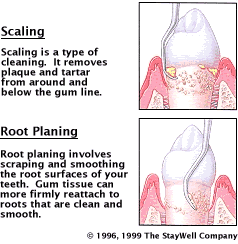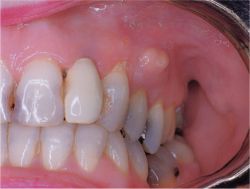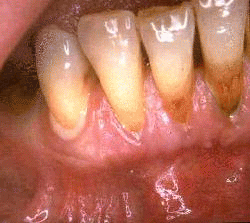Continued from the previous part
Management of chronic periodontitis
Treating periodontitis can be by the means of:
1) Control of bacterial plaque – The home remedy for periodontitis is a good oral hygiene regimen. Effective plaque removal is important for the success of controlling periodontitis. Extra care in tooth brushing and the use of interdental cleaning aids for example floss and small brushes to clean in between the teeth are required to resolve gingivitis. Your dentist may advise you to use 0.12% chlorhexidine mouth rinses for chemical plaque control. You can also make your own mouthwash using salt, baking soda or essential oils to reduce the amount of bacteria in your mouth. Local factors that disrupt proper plaque control should be removed, altered or controlled.

2) Minimize loss of tooth supporting tissues – Scaling or root planing should help resolve the inflammation of the gum pocket wall. The bacterial bulk should be reduced and frequently the symptoms will improve.
3) Surgery – When root planing fails and deep gum pockets are present, surgery may be used to cut the pockets so that you can keep the teeth roots clean. Surgical options include gingivectomy, flap operations and reattachment surgery.
4) Use of antibiotics – Tetracycline is normally used to treat periodontitis but antibiotics should not be used alone for they have little effect by themselves. Antibiotics work best as an adjunct to scaling and root planing.
5) Extraction of teeth – In advanced periodontitis where gum pocketing has extended beyond the point of saving, the teeth should be extracted. Deep gum pockets are most frequent in older people, which can be a risk for infective endocardititis for the deep pockets harbor bacteria. If infection persists, there can be excessive bone loss which may cause problems in retaining dentures.
Prognosis of chronic periodontitis
Factors affecting outcome of periodontal disease:
1)     Oral hygiene and motivation – Good oral hygiene and strong motivation to maintain it is important to ensure success in a usually long regimen of treatment.
2)     Degree of bone loss – The higher degree of bone loss, the poorer the prognosis.
3)     Age – The older the individual is, the better the prognosis as the disease is of slower progress.
4)     Tooth factors – The conditions of the tooth involved can affect response to surgery.
5)     Body immune system – A poor immune system could lead to worsening of the disease.
Complications of chronic periodontitis

Periodontal abscess © The Free Dictionary
- Abscess formation
- Loose teeth
- Tooth dropping off by itself
- Infective endocarditis
- Heart diseases
Prevention of chronic periodontitis
 Chronic periodontitis tend to occur due to poor oral hygiene or local causative factors that still persist. Therefore it is best to:
Chronic periodontitis tend to occur due to poor oral hygiene or local causative factors that still persist. Therefore it is best to:
- Practice good oral hygiene with proper tooth brushing techniques and the usage of floss and mouthwash
- Make regular appointments with your dentist to ensure your mouth stays in a healthy condition
- Maintain good general health by having proper nutrition and exercise
- Stop smoking

Pingback: Does Mouth Wash really work? | Intelligent Dental
Pingback: Causes of Sore Gums | Intelligent Dental
I use a Gripit Floss Holder – http://www.gripit.biz – to floss daily. These handy devices come with their own floss supply that can be advanced in seconds and refilled form local drug and grocery stores. They last a lifetime and don’t clog landfills. I have used one for 35 years. Knock on wood, my teeth and gums are as healthy today as they were back then.
Pingback: Chronic Adult Periodontitis: Cause and Symptoms | Intelligent Dental
It’s good to know the causes of something like periodontitis in order to prevent it from occurring in the future.
This ifnmortaion is off the hizool!